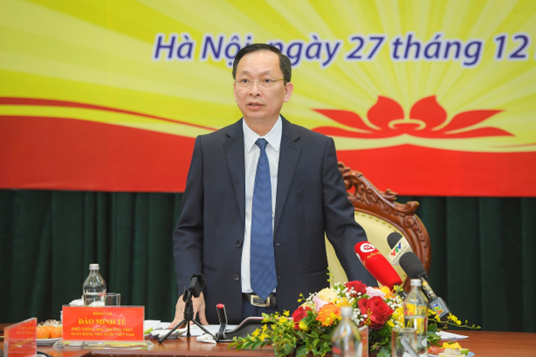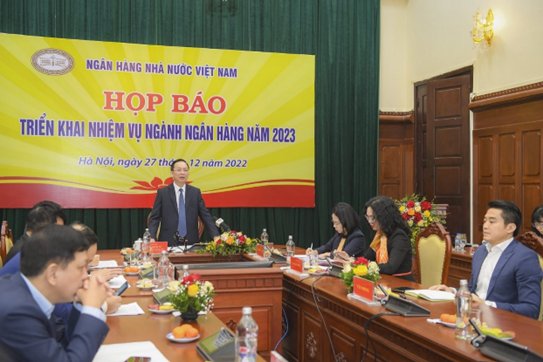
SBV’s Standing Deputy Governor Dao Minh Tu at the Press Conference on Banking Industry’s tasks implementation for 2023
Optimizing tools and measures for managing monetary policies and banking activities
According to Deputy Governor Dao Minh Tu, 2022 was a "very different" year when the economy had just escaped from two difficult years due to the Covid-19 pandemic with huge impacts on the economy, production and business, cash flow of enterprises, and supply of raw materials, transportation...
Along with that, the Russia-Ukraine conflict also affected the cash flow and as a result, many businesses faced big difficulties. The monetary policy was tightened in many countries around the world. The trend of rapidly increasing interest rates in many countries made up the rise of USD value. The interest rate hike causes capital flows to shift and economic activities become abnormal affecting the management of monetary policy in particular and macro-economy in general of Vietnam.
Dealing with this challenge, in order to cope with the rapid changes of the world and domestic situation, the SBV actively closely followed macroeconomic and monetary developments for promptly adjusting policies, issuing and deploying policies, synchronously implementing and optimizing tools and solutions to manage monetary policy and banking activities, contributing to stabilizing the macro-economy, controlling inflation at a low rate, and supporting growth recovery, ensuring the safe development of the system of credit institutions. This was reflected in the operating results of the SBV in 2022.
The SBV synchronously operated monetary policy tools to stabilize the monetary and foreign currency markets, control the inflation under the target and support economic growth in the face of the world economy’s complicated developments and geopolitical tension.
Specifically, in the first 8 months of 2022, in the context of a rapid increase in world’s interest rates with a total of 340 interest rate hikes globally and consequent increasing domestic inflation pressures, the SBV continued keeping operating interest rates unchanged facilitating credit institutions to access capital from the State Bank at low cost. However, since September 2022, the global inflation has been at high levels. The US Federal Reserve (Fed) has continuously rapidly and strongly adjusted its operating interest rates and is expected to continue this increase in the near future. The US dollar has strongly appreciated laying more pressure on domestic interest rates and exchange rates and the inflation rates.
In order to continue implementing synchronous measures, contributing to controlling inflation, stabilizing the macro-economy and currency, and ensuring the safety of the banking system, the SBV has increased the operating interest rates twice with a total rise of 2%/year; the maximum deposit interest rate in VND with a term of less than 6 months at credit institutions with a total climb of 0.8-2%/year; the maximum lending interest rate in VND for some priority sectors with a growth of 1%/year (on October 25, 2022). This is a timely solution, in line with the prevailing trend around the world to prioritize controlling inflation, keeping the foreign currency market stable, creating room to adapt to fluctuations in the market, contributing to stabilizing macro-economy stability, ensuring the systemic safety.
The SBV also directed credit institutions to reduce operating costs, administrative procedures and unnecessary expenses to have room to cut lending interest rates to support businesses and people to overcome difficulties.
Regarding exchange rates management and foreign currency market, Deputy Governor Dao Minh Tu said, many efforts of the Vietnamese Government and the SBV in working and negotiation contributed to the result that on November 10, 2022, the Department of the Treasury of the United States of America issued the Report on “Macroeconomic and foreign exchange policies of major trading partners of the United States”. Accordingly, in this reporting period, the US Department of the Treasury removed Vietnam from the WatchList for currency manipulation, and at the same time, highly appreciated the management of monetary and exchange rate policies of the Vietnam’s SBV in the context of global economy still facing many difficulties and challenges.
Despite many difficulties and challenges, the foreign currency market was basically stable, the exchange rate was actively and flexibly managed to adapt to unpredictable developments and great pressure of the international market.
“The operation of the foreign currency market was basically smooth, the legal foreign currency needs were met by credit institutions, including the demand for foreign currency to import petrol and oil, thereby contributing to macro - economic stability and inflation control" - the leader of the SBV emphasized.
Supporting economic growth - the biggest political task in 2023

Overview of the press conference
Regarding the management of solutions for credit growth, Deputy Governor Dao Minh Tu said that right from the beginning of the year, the SBV planned for the credit growth of about 14% for the whole year with adjustments in line with actual situations.
Accordingly, the SBV has realized the credit management to support economic recovery, meet capital needs for production and business with an eye to inflation risks; directed credit institutions to have safe and effective credit growth, oriented credit to production and business fields, priority areas as guided by the Government's policy; strictly controlled credit for potentially risky areas, especially the investment in corporate bonds, the investment and trading of securities, real estate, especially controlled the credit concentration on a large number of customers/customer groups, large-scale projects, high-end segment; created favorable conditions for businesses and people to access bank credit.
According to Deputy Governor Dao Minh Tu, after the decision to adjust the credit growth target for 2022 by about 1.5-2% for the whole system of credit institutions, by December 21, the credit amount for the whole economy reached over VND 11.78 million billion, an increase of 12.87% compared to the end of 2021 and 13.96% compared to the same period in 2021. The credit continued to flow to production and business. The credit for potentially risky sectors was controlled. The credit balance for 23 credit policy programs of Vietnam’s Bank for Social Policy (VBSP) as of November 30, 2022 reached about VND 279,732 billion, up by 12.81% compared to 2021 with more than 6.4 million customers having outstanding loans.
Regarding bad debts, thanks to actively implementing solutions to accelerate bad debts settlement, improve credit quality, prevent and minimize new bad debts, the bad debt ratio on the balance sheet remained at a safe level. Up to now, on-balance-sheet bad debts remain at less than 2% (1.92%). However, Deputy Governor Dao Minh Tu still noted the risk of bad debts increase in 2023.
Continuing to implement some urgent solutions to remove difficulties and support customers affected by the Covid-19 pandemic to access loans at credit institutions, by the end of June 2022, credit institutions have extended the debts’ maturity, maintained debt groups with accumulated debts value of more than 722,000 billion VND with nearly 1.1 million customers; exempted, reduced interests, fees, kept the same debt groups with accumulated debts value of over 92,000 billion VND with nearly 562,000 customers; Refinanced the VBSP to lend employers to pay unemployment benefits, wages to restore production according to the Government's Resolution, the Prime Minister's Decision...
Up to now, most credit institutions have been developed or planned to develop and implement digital transformation strategies; actively applied technologies of Industry 4.0, simplified business processes. Many basic operations have been completely digitalized; Many banks have recorded more than 90% of transactions with customers done via digital channels.
In the first 11 months of 2022, non-cash payment activities increased by 85.6% in volume and 31.39% in value; via Internet channel 89.36% and 40.55% respectively; via mobile phone channel 116.1% and 92.3% respectively; via QR code method 182.5% and 210.6% respectively; transactions via POS 53.57% and 48.78% respectively; ATM transactions 13.28% and 14.04% respectively.
Regarding the direction of monetary policy in 2023, Deputy Governor Dao Minh Tu emphasized that the biggest political tasks for 2023 are controlling inflation, ensuring the goals set by the National Assembly, and supporting economic growth. Therefore, the SBV has determined to continue prudent and flexible monetary policy operation, synchronize monetary policy tools, closely coordinate with fiscal policy and other macroeconomic policies to contribute to controlling inflation rate at around 4.5%, stabilizing the macro-economy, ensuring major balances of the economy; stabilize the currency and foreign exchange markets and ensure the safety of the banking system; reasonably regulate monetary tools with operating interest rates and exchange rates in line with the market situation, macroeconomic developments and monetary policy objectives.
Besides, the SBV would reasonably manage credit growth in line with macroeconomic developments, contributing to controlling inflation, supporting economic recovery and growth; concentrate capital on production and business fields, especially priority areas; control credit to risky fields, improve credit quality; continue to promote the implementation of tasks of the banking sector in the program of socio-economic recovery and development, national target programs.
Besides, the project "Restructuring the system of credit institutions associated with bad debts settlement in the 2021-2025 period" would be drastically implemented speeding up the handling of bad debts, strengthening the inspection and improve the effectiveness of macro and micro safety supervision; improve management capacity and efficiency for credit institutions...
The SBV would continue to review, amend and supplement the legal framework, mechanisms and policies on monetary and banking activities, ensuring the money market and banking operations in a safe, healthy, smooth and sustainable manner; effectively implement the project of developing non-cash payment in Vietnam for the period of 2021-2025.
Solutions would be further implemented to promote digital transformation of banking activities to apply new business models and provide convenient and safe technology products and services to meet the needs of people and enterprises; The security and safety of the information technology system in the banking industry would be ensured, legitimate interests of customers would be protected.

























